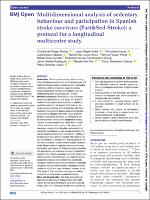Por favor, use este identificador para citar o enlazar este ítem:
https://repositorio.usj.es/handle/123456789/1023
| Título : | Multidimensional analysis of sedentary behaviour and participation in Spanish stroke survivors (Part&Sed-Stroke): a protocol for a longitudinal multicentre study |
| Autor: | De Diego Alonso, Cristina



Alegre-Ayala, Jorge 
Buesa-Estelléz, Almudena 
Blasco-Abadía, Julia 
López-Royo, María Pilar 

Roldán Pérez, Patricia 

Giner Nicolás, Rafael 
Gueïta-Rodríguez, Javier 

Fini, Natalie Ann 

Doménech García, Victor 

Bellosta-López, Pablo 

|
| Palabras clave : | Neurological injury; Neurology; Stroke medicine; Stroke |
| Fecha de publicación: | jun-2023 |
| Editorial : | BMJ PUBLISHING GROUP |
| Citación : | de Diego-Alonso C, Alegre-Ayala J, Buesa A, et alMultidimensional analysis of sedentary behaviour and participation in Spanish stroke survivors (Part&Sed-Stroke): a protocol for a longitudinal multicentre studyBMJ Open 2023;13:e065628. doi: 10.1136/bmjopen-2022-065628 |
| Resumen : | Introduction Stroke survivors usually experience long-lasting functional, emotional and social consequences that might contribute to sedentary behaviour and participation restrictions, which are important targets to address during rehabilitation. However, the trajectory and inter-relationship between these factors are unknown. Methods and analysis Part&Sed is a research project based on an observational study design with 6 and 12 months of follow-ups in stroke survivors. In addition, a qualitative analysis of the impact of the stroke on the stroke survivor, validation of the Satisfaction with Daily Occupation-Occupational Balance assessment tool and analysis of the reliability of the Fitbit Inspire 2 activity tracker wristband will be carried out. Participants will be chronic stroke survivors with independent walking capacity. Sociodemographic and clinical data, physical activity, ambulation, sleep, quality of life, anxiety and depression, community participation, and occupational satisfaction and balance, as well as data provided by the activity tracker wristband, will be collected. In addition, if the participant has a primary caregiver, the caregiver will also be monitored. A minimum of 130 participants will be recruited to conduct a random-effects multiple regression model. Mixed models for repeated measures will assess the variation over time of the different variables associated with participation and sedentary behaviour. Psychometric properties (eg, internal consistency, construct validity, test–retest reliability) of the Satisfaction with Daily Occupation-Occupational Balance will be determined. Additionally, intraclass correlation coefficients and minimum detectable change will be calculated to assess intrasubject reliability of physical activity and sleep parameters recorded by the Fitbit Inspire 2. The qualitative analysis process will be carried out using the analysis proposed by Giorgi. Ethics and dissemination The study received ethical approval from the Spanish Regional Ethics Committee ‘Comité de Ética de la Investigación de la Comunidad de Aragón’ (PI21/333). The results will be made available via peer-reviewed publications, international conferences and official channels. |
| URI : | https://repositorio.usj.es/handle/123456789/1023 |
| ISSN : | 2044-6055 |
| Aparece en las colecciones: | Artículos de revistas |
Ficheros en este ítem:
| Fichero | Descripción | Tamaño | Formato | |
|---|---|---|---|---|
| Multidimensional analysis of sedentary.pdf | 735,08 kB | Adobe PDF |  Visualizar/Abrir |
Este ítem está sujeto a una licencia Creative Commons Licencia Creative Commons

